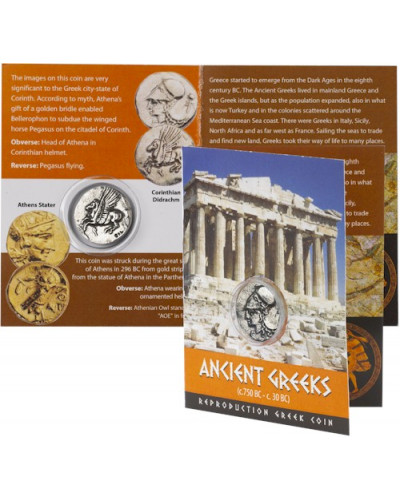Greek Coin Pack - Corinthian Didrachm
- Product Code: GCP2
- Availability: In Stock
- Pack Qty: 10
Product Description: This reproduction Corinthian Didrachm is moulded directly from an original coin and is made from lead-free pewter. The wallet type packaging has a hole on the front in which the coin is held in a clear blister. The coin pack has images of the Acropolis on the front, the two coins in the collection inside, as well as additional Greek images. It has historical information about the coins and about the rise and fall of the Ancient Greek empire.
Information: The images on the reproduction Corinthian Didrachm coin are very significant to the Greek city-state of Corinth. According to myth, Athena's gift of a golden bridle enabled Bellerophon to subdue the winged horse Pegasus on the citadel of Corinth. The obverse of the coin depicts the head of Athena and the reverse Pegasus.
Greece started to emerge from the Dark Ages in the eighth century BC. The Ancient Greeks lived in mainland Greece and the Greek islands, but as the population expanded, also in what is now Turkey and in the colonies scattered around the Mediterranean Sea coast. There were Greeks in Italy, Sicily, North Africa and as far west as France. Sailing the sea to trade and find new land, Greeks took their way of life to many places.
There was not one country called Greece. Instead, there were small ‘city-states’. Each city-state had its own government. Sometimes the city-states fought one another, sometimes they joined together. Athens, Sparta, Corinth and Olympia were four of the largest city-states.
The Greeks created a way of life that other people admired and copied. The Romans copied Greek art and Greek gods for example. The ancient Greeks tried out democracy, started the Olympic Games and left ideas in science, art and philosophy.
Alexander the Great intended to create a Greek empire that incorporated most of the known world. Unfortunately, he died in 323BC and the empire was split among his quarrelling generals. These kingdoms preserved many aspects of Greek life but were eventually overcome by the rising power of Rome.
Tags: Corinthian Didrachm, Coin Pack, Pewter, Greek

